Gavin Ortlund is a Protestant Christian who recently made a video titled, “Before You Become Eastern Orthodox…” so I have titled my own response, “Before You Listen to Gavin Ortlund About Orthodoxy.” I seek to charitably answer Gavin’s critiques as he bases his video off of my patron saint, St. Theophan the Recluse. Here is the link to the video for reference: https://youtu.be/q7eih3Bqgv0?si=yuWztuymIp5S9J0Y
May God grace my words and let it be unto Gavin and his followers edification and mutual understanding and love. In the name of the Father, the Son, and the Holy Spirit. Amen.
Truly Exegeting St. Theophan
To start, Gavin says he is going to exegete what St. Theophan, an Eastern Orthodox saint, is saying in his letters to an Orthodox Christian who has encountered a Protestant missionary in Russia. In all kindness, Gavin fails in doing this in a couple of ways. His first slide deals with St. Theophan’s response:
Gavin questions the authority that you have to be appointed a preacher by the Church. He cites Mark chapter nine as evidence that anyone can proclaim Christ while ignoring other biblical passages in Holy Scripture that speak of the exact thing St. Theophan illustrates. Such as Hebrews 5:4, “Moreover, nobody assumes this honor by himself but one is called by God, just as Aaron was.” No one can appoint themselves as a bishop according to St. Paul. There were fixed and definite laws in regard to the succession in the office of the high priest, and to the qualifications of him who should hold the office. And St. Paul in Hebrews 5 is doing the same for qualifications of a bishop.
Acts 14:23, “After appointing presbyters for them in every Church, with prayer and fasting, Paul and Barnabas committed them to the Lord in whom they placed their trust.” Here is Paul and Barnabas appointing presbyters (priests) to the Church. This shows the Church and the apostles are doing the appointing as St. Theophan is proclaiming. And the connectedness of the Church with Christ.
Moving on, Gavin at 8:39 of the video replies to St. Theophan by saying people constantly need the gospel preached to them even in the Church. Which of course is true, we agree here, we read the gospel every single Divine Liturgy. The Holy Scriptures are vital to all Christians. St. Theophan’s point is that this person already knows Christ, so it should strike him as odd why a Protestant is telling him he needs to know Christ as if He doesn’t.
Around 9:05 he begins showing this slide, which he skips the middle portion of what St. Theophan says straight down to giving the impression that St. Theophan and Orthodoxy as a whole have this notion that “You’re not Orthodox? You’re a heretic and assuredly going to hell!” He is priming this narrative further along but let’s look at the portion he skipped.
“He used to be Orthodox but fell away from Orthodoxy.” This is a key context here, this preacher trying to lure people away from the Orthodox Church was Orthodox himself previously. That is indeed much different than someone who has never been Orthodox, or a missionary who doesn’t know any better, or truly know Orthodoxy.
Because this man received the fullness of the Truth and rejected it, he is held to a different standard than someone who has never been a member of the Holy Orthodox Church. This is exactly why Orthodoxy’s reception is much different than Protestant reception, it’s not an immediate “let’s baptize you right now” in most circumstances (yes there’s exceptions for someone gravely sick; etc). The emphasis is learning and taking time initially, because it’s like crossing a line there’s no real turning back from once you’re received into the Church. The same way when you’ve fully accepted Christ, there’s no real turning back. These are not opposed concepts between the Church and Christ in an either-or manner lest someone infer that they are. I’ll get more into that.
St. Theophan also gives the example just because someone learns to speak Russian doesn’t mean they were born in Russia and are Russian. He’s laying this out the same regarding God, just because a Muslim says they believe in God doesn’t mean they believe in the same God as a Christian. It’s a word concept fallacy. The same way when someone says they believe in Christ doesn’t necessarily mean they believe in Him the same way you do doctrinally. “For there shall arise false Christs, and false prophets, and shall shew great signs and wonders; insomuch that, if it were possible, they shall deceive the very elect.” (Matthew 24:24).
At 11:08, Gavin goes into the history of what Orthodoxy believes regarding Protestantism and Roman Catholicism. Then into this slide:
Gavin emphasizes the word “saving” implying again, that this somehow means if you’re not Orthodox you’re not going to heaven. Or that Orthodoxy is a straight ticket into heaven. It’s laying on Protestant presuppositions to what we actually believe. He ignores St. Theophan saying “whole” which is what Orthodox believe, it is the fullness and the whole Truth. It doesn’t mean Protestants have no truth at all, or can’t be saved, but that this is the way Christ gave us. And if you turn that around, Protestants believe the exact same way against Orthodoxy.
Otherwise there would be no “before you become Eastern Orthodox” video made at all, because Gavin and Protestants out of truly the best intentions I believe personally, think that Orthodoxy is not the fullness or the whole Truth. Yet they don’t say we aren’t Christians, that we don’t have any truth, or that we can’t possibly be saved. This is what we believe as well. However this is the contest of Gavin’s video; to say historically we don’t believe this. I’ll answer this at the end of the article, so let’s continue.
At 14:34 Gavin goes onto this side:
Clearly St. Theophan says this is a correct joyous message that Christ died for you. There’s nothing wrong with that, but he warns and points out that many times falsehoods are placed along top of or with actual truth. I don’t think any Christian would find this controversial, most of us know the devil isn’t usually just outwardly evil and opposition to us but uses cunning deception using parts of truth and distorting bits of it with lies. But again, Protestants in action think the same thing of us and Roman Catholics, they believe we are preaching a different Christ to some degree doctrinally otherwise they wouldn’t be coming trying to convert people away from it in the first place.
17:03, St. Theophan gives what is important for salvation.
Gavin says this is a very “ecclesiastical” response, again laying on Protestant presuppositions that Christ and the Church are opposing things to be pitted against each other. “You either follow Christ or you follow the Church,” this line of thinking is foreign to Christians throughout history even into some of the Reformers of the Protestant Reformation themselves.
Gavin brings up how St. Theophan says Faith in the Divine Mysteries are important for salvation, as in the sacraments and being united in a living communion to the Church. And at 18:21, St. Theophan saying “there is no other way to salvation.” Again, under a Protestant mindset this seems offensive, as there is a divorce from connecting Christ and the Church.
Being united in a living communion to the Church is the same as being united in a living communion to Christ. Gavin ignores probably not maliciously or intentionally; when St. Theophan says “the salvation of each soul is worked out mystically.” Meaning God is the Judge of someone’s salvation and if they have been united to Him, either in the normative or non-normative way. God does this mystically how He wants.
Also there is the obvious reference to Christ speaking in John 6:53, "Truly, truly, I say to you, unless you eat the flesh of the Son of Man and drink his blood, you have no life in you.” Clearly this is proving St. Theophan that the Divine Mysteries such as the Eucharist are important to one’s salvation.
So what is the true exegesis of St. Theophan the Recluse? It can be summed up in his own words: “You ask, will the heterodox be saved… Why do you worry about them? They have a Saviour Who desires the salvation of every human being. He will take care of them. You and I should not be burdened with such a concern. Study yourself and your own sins… I will tell you one thing, however: should you, being Orthodox and possessing the Truth in its fullness, betray Orthodoxy, and enter a different faith, you will lose your soul forever.”
Clearly Christ will take care of those Christians and non-Christians outside of Orthodoxy, and He will take care of us too. Just as Protestants believe God is caring for those in the Orthodox and Catholic Churches even if they don’t agree doctrinally. To us who have been given much, we will have to account for much. Every rebuke Christ gives in the gospels to people are those who are in the Church, not outside of it.
No Salvation Outside of Orthodoxy?
This topic I actually just recently wrote on but haven’t fully released yet titled “Who Will Be Saved?” At 24:00 minutes in Gavin gets to the crux of his video, he says the conclusion is “you have to be Eastern Orthodox to be saved.” Gavin immediately says exactly what I’ve been pointing out in this whole article by him believing in an either-or dichotomy between Christ and the Church. “Is there a danger of idolatry of the Church?” he says.
In 1 Timothy 3:15, the Church is described as the pillar and foundation of Truth. We also know Christ is Truth Himself. He is the Head of the Church (Ephesians 1:22) and the Church is His Body (Ephesians 1:23). The question of “is there a danger of idolatry of the Church?” is akin to saying “is there a danger of idolatry of Christ?”
There is indeed no salvation outside the church but what are we saying here? The Church is Christ. There is no salvation outside of Christ. God can join anyone to Himself, the Church, His mystical Body, however He wants. Therefore, there is no salvation outside the Church (Christ) because God will join all of us to Himself, as we hope He does for both me, you, and everyone. All of us have errors to be freed from to unite with Him. Therefore “no one is saved outside the Church (Christ)” and “those outside of the Church can be saved” is not a contradiction, but a paradox.
Being a member of the Eastern Orthodox Church is not like punching a ticket for salvation. It is likely that there will be people saved outside of formal membership with the Orthodox Church, it is also likely that there will be people who are Orthodox and are not saved. Again, we ultimately do not know and it’s not for us to know. “The first to enter heaven was a thief. And the first to enter hell was an apostle of Christ. And how all this happened is a great lesson for us. Therefore, one should never despair nor give up on another.” + Metropolitan Athanasios of Limassol.
Gavin presents another either-or dichotomy to those considering Orthodoxy at 29:15 of the video when he says “you have two options, you can say 1) Theophan is wrong and the entire Tradition he represents is wrong or 2) you can say he’s right, and the 2 billion Christians in the West are damned” because they don’t have access to the Orthodox Church and it’s Sacraments. I reject the dialectic premise trying to pin us down an alley, because the exegesis from the start is flawed, and I say all of this cordially to Gavin. St. Theophan is right and the implications are wrong.
Historical Evidence & Consistency
“How do you explain the Christian fruit in the West?” says Gavin. This is not an issue, how do you explain Christian fruit of caring for the poor in Islam? Does this mean they have done something good and true? Yes. Does this by virtue mean Islam is correct? Surely not.
He goes on “words have no meaning” if his interpretation doesn’t entail the damnation of all non-Orthodox. He says this is historically the position of the Orthodox Church. And again it’s not. Here is St. Paul saying it’s not our business to know who will be saved. “But the righteousness of faith speaks in this way, “Do not say in your heart, ‘who will ascend into heaven?’ that is to bring Christ down from above).” - Romans 10:6.
We need to focus on our own salvation with fear and trembling. Gavin saying this is a reason to not be Orthodox is using a reasoning that St. Paul says not to bother ourselves with. Here’s St. Maximus the Confessor (living in the late 500’s to early 600’s) saying the following about pagans, let alone other Christians:
“When all the people in Babylon were worshipping the golden idol, the Three Holy Youths did not condemn anyone to perdition. They did not concern themselves with what others were doing, but took care only for themselves, so as not to fall away from true piety. In precisely the same way, Daniel also, when cast into the den, did not condemn any of those who, in fulfilling the law of Darius, did not want to pray to God; but he bore in mind his duty, and desired rather to die than to sin and be tormented by his conscience for transgressing God's Law. God forbid that I, too, should condemn anyone, or say that I alone am being saved. However, I would sooner agree to die than, having apostatized in any way from the right faith, endure the torments of my conscience."
Therefore St. Theophan in the 1800’s is just restating the same position as St. Maximus in the 600’s who is restating the same position as St. Paul explicated in the 1st century. This is a historical consistency despite what Gavin asserts. God saves who He wants, and that is His business because He is Judge but I will concern myself with preserving what He has given, Himself in the Church, and my own salvation. This is the historical, patristic, and spiritual stance.
Christ have mercy on us all.

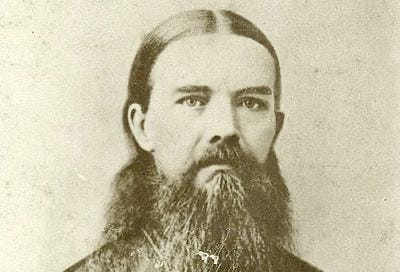



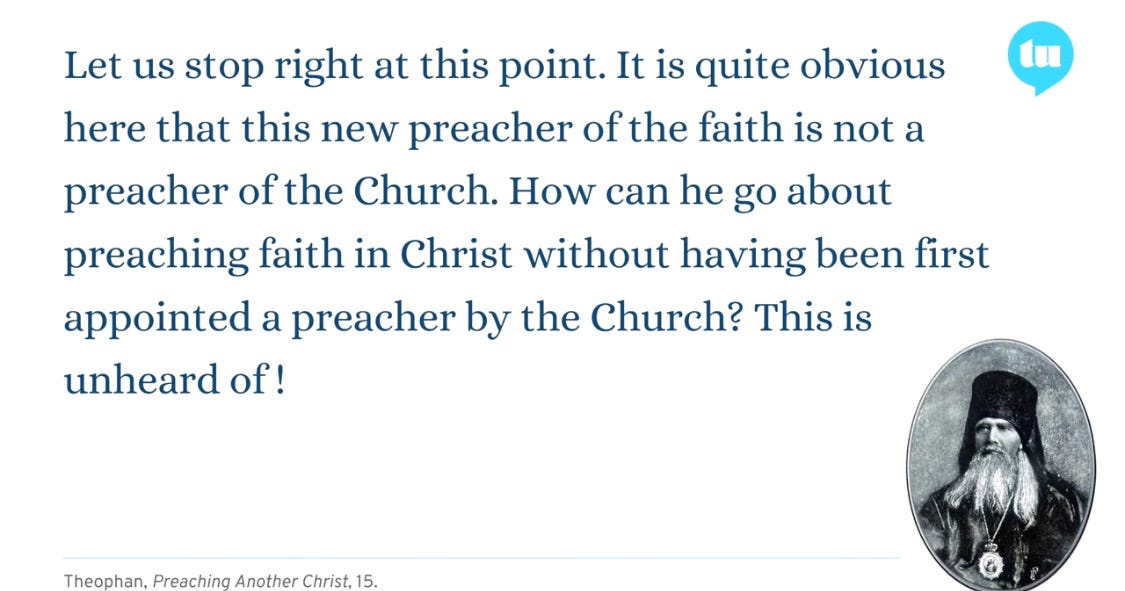
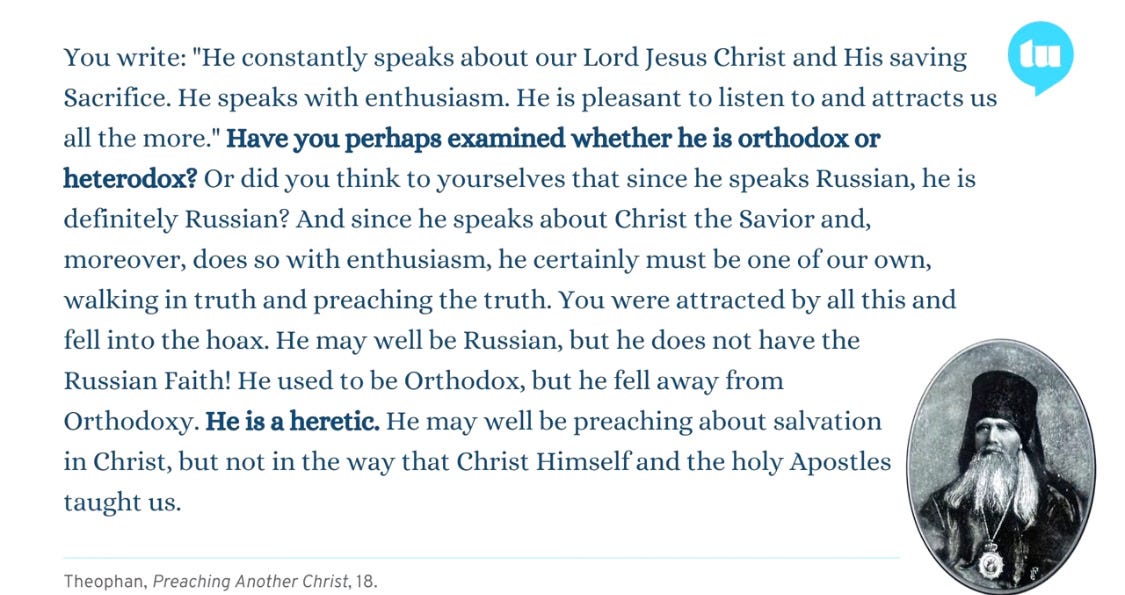
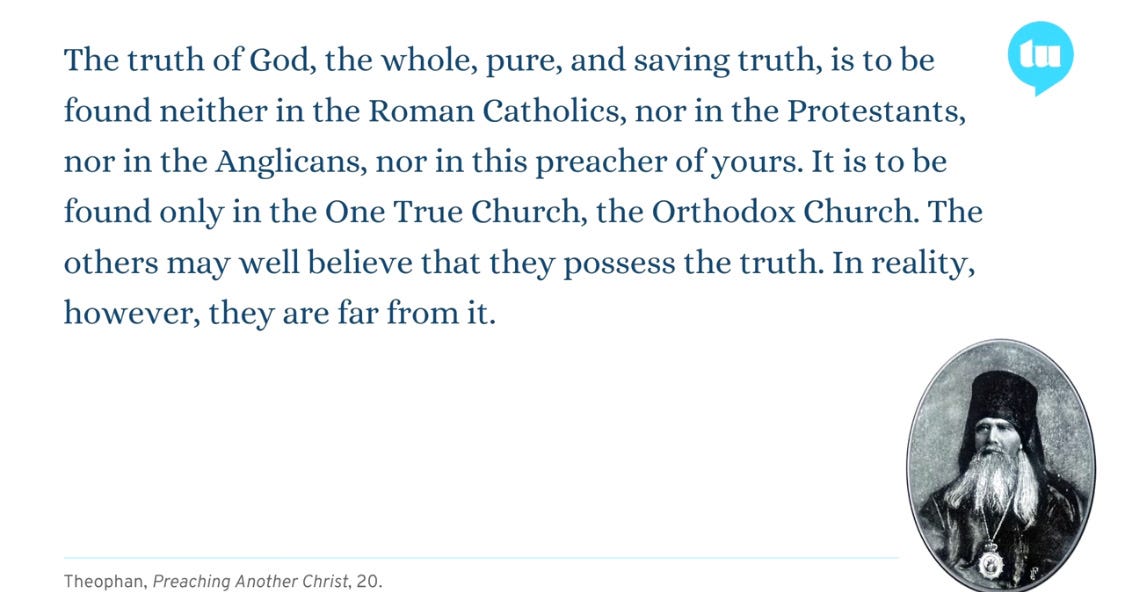
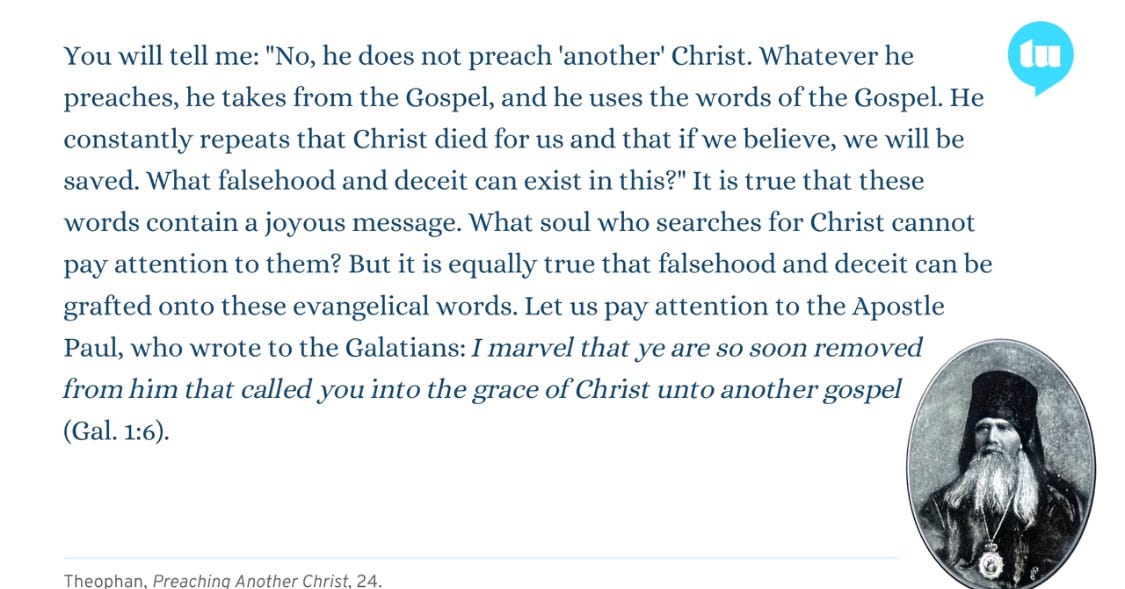
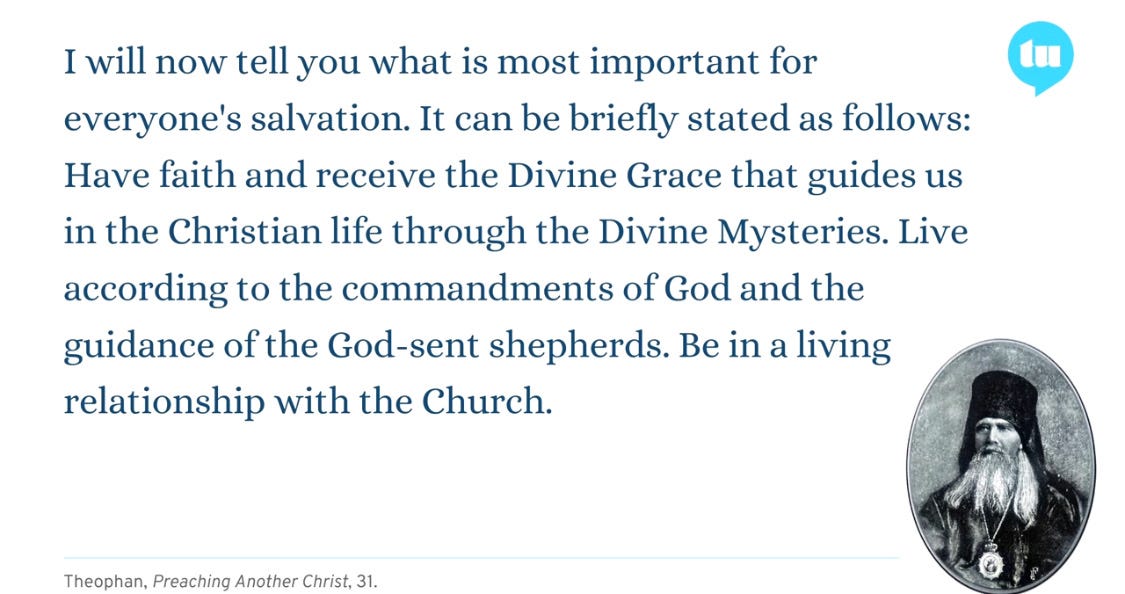
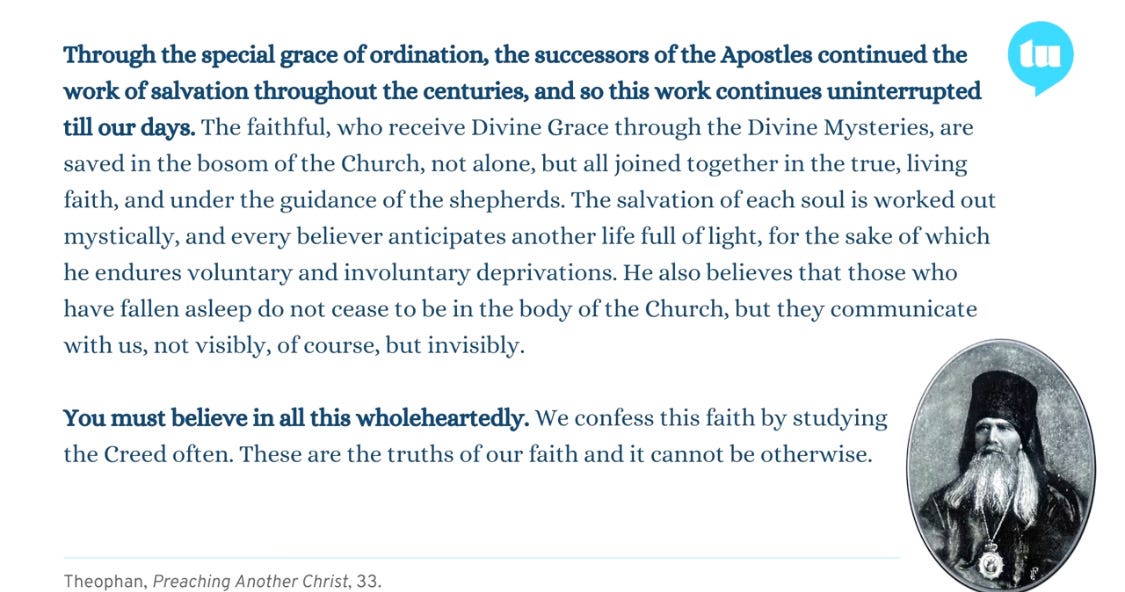
The protestant trying to always figure out the exact formula for salvation is tiresome.
There is a lot of projection going on: Protestants tend to view things in logical and binary ways, and they often attribute that type of thinking to the Orthodox. Likewise, it is far more common in Protestantism to take a view on other people's salvation: "Muslims are not saved." Or "Catholics are not saved." As you laid out in great detail here, that entire mode of thinking is foreign to Orthodoxy: God is the judge, not us. His mercy and his economy are for Him to decide, not us. I never hear Orthodox taking a position on anyone's salvation, Orthodox or not, Christian or not, etc.
The importance of the Orthodox phronema, or way of thinking, cannot be emphasized enough. Debates and arguments are, for that reason, fraught with problems and are usually fruitless. Orthodoxy is not about "winning an argument". If Ortlund cannot understand the Orthodox phronema, he will engage in fruitless debate. And if he does understand the phronema ..., well, then he is likely to ultimately end up Orthodox...